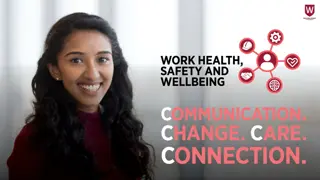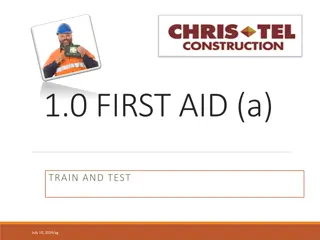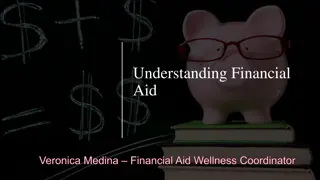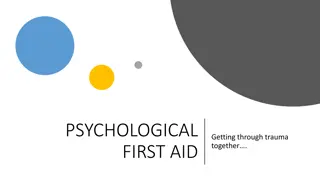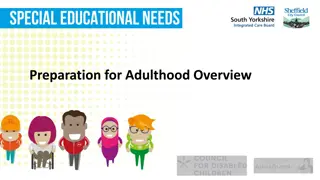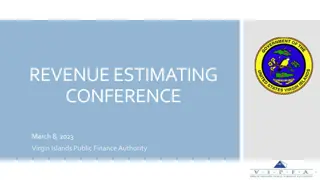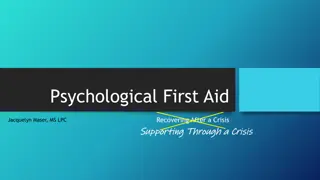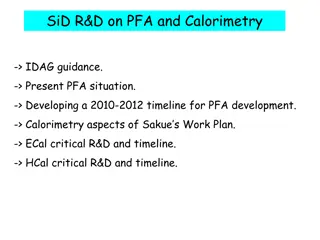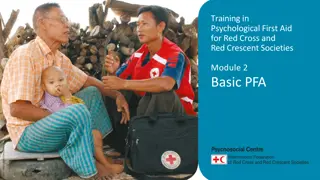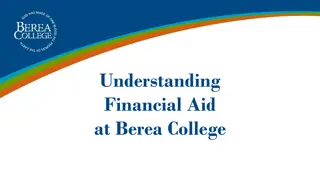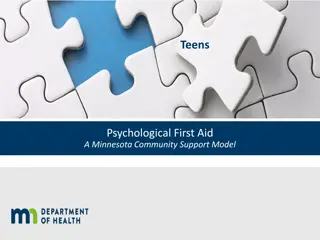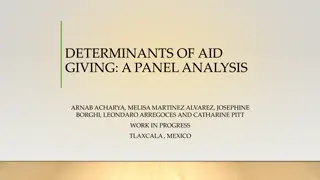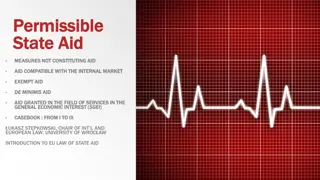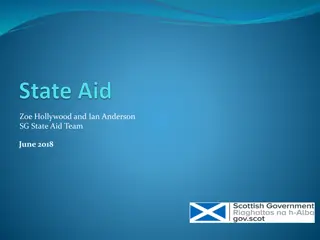Psychological First Aid (PFA) Workshop Insights
Explore the Psychological First Aid (PFA) workshop details including self-care practices, group work guidelines, simulation discussions, and the essence of PFA as a humane and practical approach to supporting individuals in distress.
Download Presentation

Please find below an Image/Link to download the presentation.
The content on the website is provided AS IS for your information and personal use only. It may not be sold, licensed, or shared on other websites without obtaining consent from the author. Download presentation by click this link. If you encounter any issues during the download, it is possible that the publisher has removed the file from their server.
E N D
Presentation Transcript
Session 1 Welcome
Psychological First Aid (PFA) Co-joint workshop Date: Kathmandu
Starting with Care for Ourselves Take a moment to reflect and write down: What I do to take care of myself? What does my team (family, colleagues) do to take care of each other? Save your paper for later discussion!
When doing group work/in discussions, lets agree to: Give everyone in a chance to talk Contribute by sharing your views/experience Listen to others views even if they are different from yours. Everyone s point is valid Be responsible to manage time so as to do tasks within available time Accept that responses don t have to be perfect. We are talking together to explore a topic. Focus on the topic at hand when sharing experiences/ views. Be realistic. Be serious. Be open to new perspectives.
Session 2 Understanding PFA
PFA Simulation discussion What was it like as a helper responding to this situation? How did you feel as you entered the scene? How did you feel later? As a helper, what did you do well? Did you feel that you were making a difference? What could you as helper(s) have done better? What was it like as a adult/child affected by this disaster? How did you feel supported or helped by the helpers? Was there anything the helpers said or did that was NOT helpful, or could have done better?
What comes to your mind when you hear Psychological First Aid (PFA)? Brainstorming and sharing!!!
PFA is a humane, supportive & practical assistance to fellow human beings who recently suffered a serious stressor
What PFA is Non-intrusive, practical care and support Assessing needs and concerns Helping people to address basic needs (food, water) Listening, but not pressuring people to talk Comforting people and helping them to feel calm Helping people connect to information, services and social supports Protecting people from further harm
What PFA is NOT NOT something only professionals can do NOT professional counselling NOT a clinical or psychiatric intervention (although can be part of good clinical care) NOT psychological debriefing NOT asking people to analyze what happened or put time and events in order NOT pressuring people to tell you their story, or asking details about how they feel or what happened
PFA: Who? Very distressed people who were recently exposed to a serious stressful event Adults and children of all ages Not everyone who experiences a crisis event will need or want PFA Don t force help on those who don t want it, but make yourself available and easily accessible to those who may want support Like adults, some children cope very well with difficult experiences.
Who needs more advanced support than PFA alone? People with serious life- threatening injuries People so upset they cannot care for themselves or their children People who may hurt themselves People who may hurt or endanger others lives People who may need special attention: For example children, people with disabilities - We will discuss this later
PFA: When? Upon first contact with a very distressed adult or child, usually immediately following an event, or sometimes a few days or weeks after
PFA: Where? Wherever it is safe enough for you to be there Ideally with some privacy (as appropriate) to protect confidentiality and dignity of the affected adult or child
Why PFA? People do better over the long-term if they oFeel safe, connected to others, calm & hopeful oHave access to social, physical & emotional support oRegain a sense of control by being able to help themselves
Specialized services Specialized psychiatric/ psychological care Focused, non- specialized support Support to promote mental wellbeing; psychological first aid etc E.g. Support to trace family members ; set up child friendly spaces Community and family support E.g. providing food/shelter Basic services and security Intervention pyramid for MHPSS in emergencies. Adapted from IASC guidelines for MHPSS
Session 3 Crisis and Reactions
Types of crises/disasters Personal, affecting individuals/ families Collective community Collective affecting people in particular geographic locations Natural hazards leading to disasters Human- made crises/disasters
Responses to Crisis Events No two people respond the same way. Adults & children may have very different reactions.
Response depends on: the meaning that affected people give to the event and its aftermath. our subjective appraisal of danger, rather than objective facts. level of stress - perceived threat in light of perceived available resources to cope with the stress.
Adults distress reaction to crisis Physical symptoms (shaking, headaches, fatigue, loss of appetite, aches & pains) Anxiety, fear Weeping, grief and sadness Guilt, shame (for having survived, or for not saving others) Elation for having survived Being on guard, jumpy Anger, irritability Immobile, withdrawn Disoriented not knowing one s name, where one is from or what happened Not responding to others, not speaking at all Feeling confused, emotionally numb, feeling unreal or in a daze Unable to care for oneself or one s children (not eating or drinking, not able to make simple decisions) Important: Consider cultural context
Event related factors Person related factors Location and environment related factors Family & community related factors
Why PFA? Key resilience factors People do better over the long-term if they Feel safe, connected to others, calm & hopeful Have access to social, physical & emotional support Regain a sense of control by being able to help themselves
Helping people in distress Most people recover well over time, especially if they can restore basic needs and receive support (PFA). Those with severe or long-lasting distress may require more support. Try to make sure they are not left alone. Try to keep them safe until the reaction passes or you can find help from others.
Session 4 Communication
Good Communication: Things to Say and Do Try to find a quiet place to talk and minimize outside distractions. Stay near the person but keep an appropriate distance depending on their age, gender and culture. Let them know you hear them, for example, nod your head and say hmmmm. Be patient and calm. Provide factual information IF you have it. Be honest about what you know and what you don t know. I don t know but I will try to find out about that for you. Give information in a way the person can understand keep it simple. Acknowledge how they are feeling, and any losses or important events they share with you, such as loss of home or death of a loved one. I m so sorry Respect privacy. Keep the person s story confidential, especially when they disclose very private events. Acknowledge the person s strengths and how they have helped themselves.
Good Communication: Things NOT to Say and Do Don t pressure someone to tell their story. Don t interrupt or rush someone s story. Don t give your opinions of the person s situation, just listen. Don t touch the person if you re not sure it is appropriate to do so. Don t judge what they have or haven t done, or how they are feeling. Don t say You shouldn't feel that way. or You should feel lucky you survived. Don t make up things you don t know. Don t use too technical terms. Don t tell them someone else s story. Don t talk about your own troubles. Don t give false promises or false reassurances. Don t feel you have to try to solve all the person s problems for them. Don t take away the person s strength and sense of being able to care for themselves.
Session 5 Action Principles and Ethical Guidelines
PFA Action Principles Prepare ------------------- Look Listen Link
PFA Action Principles Learn about the crisis event. Learn about available services and supports. Learn about safety and security concerns. Prepare Observe for safety. Observe for people with obvious urgent basic needs. Observe for people with serious distress reactions. Look QuickTime and a decompressor are needed to see this picture. Make contact with people who may need support. Ask about people s needs and concerns. Listen to people and help them feel calm. Listen QuickTime and a decompressor are needed to see this picture. Help people address basic needs and access services. Help people cope with problems. Give information. Connect people with loved ones and social support. Link QuickTime and a decompressor are needed to see this picture.
5 essential principles 1.A sense of safety 2.Calming 3.Self- and community efficacy 4.Social connectedness 5.Hope
Learn about the crisis event. Learn about available services and supports. Learn about safety and security concerns. Prepare Crisis situations can be chaotic They often require urgent action Wherever possible BEFORE you enter a crisis site, try to obtain accurate information so you can be safe and effective.
Prepare Before you enter a crisis site, try to learn about What happened? Where? When? How many and who are affected? Who is providing for basic needs (emergency medical care, food shelter)? When and where can people access services? Who is helping, including community members? Is the crisis over or ongoing (aftershocks, fighting)? What dangers may be in the environment? Are there places to avoid due to insecurity or because it is not permitted to be there? How do you prepare yourself ? What are the main considerations How do you prepare yourself when helping someone/group of people in a emergency situation such as an accident or sudden illness? The Crisis Event Available Services Safety and Security
observe for safety. observe for people with obvious urgent basic needs. observe for people with serious distress reactions. Look Crisis situations can change rapidly What you encounter may be different from what you learned before entering Take time even a quick scan to LOOK around before offering help Be calm Be safe Think before you act
Observe for safety. Observe for people with obvious urgent basic needs. Observe for people with serious distress reactions. What dangers can you observe? Can you be there without harm to yourself or others? Look If you re not certain about safety DO NOT GO! Seek help from others. Communicate from a safe distance. Know your role. Try to obtain help for people who need special assistance. Refer critically injured people for care. Safety Is anyone critically injured Does anyone need rescue? Does anyone have obvious needs (e.g., torn clothing)? Who may need help to access services or to be protected? Who else is available to help? How many & where are they? Is anyone extremely upset, immobile, not responding to others or in shock? People with obvious urgent basic needs Consider who may benefit from PFA and how best to help. People with serious distress
People who Likely Need Special Attention (to be safe to access services Children and adolescents Especially those separated from caregivers People with health conditions and disabilities People who are non-mobile, or who have chronic illness, hearing/visual impairments (deaf or blind), or severe mental disorders Frail elderly people, pregnant or nursing women People at risk of discrimination or violence Women, people of certain ethnic or religious groups, people with mental disabilities
Make contact with people who may need support. Ask about people s needs and concerns. Listen to people and help them feel calm. Listen
MAKE CONTACT Approach respectfully Introduce yourself by name & explain who you are, what you do, why you are there Ask if you can provide help, find safe/quiet place Help person feel comfortable (water, blanket) Try to keep them safe. ASK FOR NEEDS AND CONCERNS Although some needs are obvious, always ask Find out person s priorities what is most important to them. LISTEN AND HELP THEM FEEL CALM Stay close to the person Do not pressure them to talk Be comfortable with silence, be present Listen in case they want to talk If very distressed, help them feel calm & make sure they are not alone.
Help People Feel Calm Keep your tone of voice soft and calm Maintain some eye contact (go to child s level) Reassure them they are safe and that you are there to help If someone feels unreal, help them to make contact with: Themselves (feel feet on the floor, tap hands on lap) Their surroundings (notice things around them) Their breath (focus on breath & breathe slowly)
Help people address basic needs and access services Help people cope with problems Give information Connect people with loved ones and social support Link Help people Help people to to help help themselves themselves and and regain control regain control of of their their situation. situation.
Link basic needs What needs do they request? What services are available? Don t overlook the needs of vulnerable or marginalized people Follow up if you promise to do so
Link help children and adults cope with problems Distressed people may feel overwhelmed with worries Help them prioritize urgent needs (what to do first) Help them identify supports in their life Give practical suggestions how they can meet their needs (e.g. registering for food aid) Help them remember how they coped in the past and what helps them to feel better.
Positive coping strategies (adjust for culture) Help people use their natural coping mechanisms to regain a sense of control: Get enough rest, eat as regularly as possible, drink water Talk and spend time with family and friends Discuss problems with someone you trust Relax: walk, sing, pray, play with children Exercise Avoid alcohol or drugs, caffeine, nicotine Attend to personal hygiene Keep routines, especially for children (Help children/adolescents) Find safe ways to help others
Link give information Find accurate information before helping Keep updated Make sure people are informed where & how to access services especially vulnerable people Say ONLY what you know don t make up information Keep messages simple & accurate, repeat often Give same infomation to groups to decrease rumours Explain source & reliability of info you give Let them know when/where you will update them
Link social support Social support is very important to recovery Keep families together & children with caregivers Help people contact friends and loved ones Give access to religious support Affected people may be able to help each other bring them together Make sure people know about how to access services (especially vulnerable people).
Ending your assistance Use your best judgment of person s needs and your own needs. Explain you are leaving and, if possible, introduce them to someone else who can help. If you linked them with services, be sure they have contact details and know what to expect. No matter what your experience, say goodbye in a good way, wish them well.
Summary: Ethical Guidelines Do s Don ts Be honest and trustworthy Respect a person s right to make their own decisions Be aware of and set aside your own biases and prejudices Make it clear to people that even if they refuse help now, they can still access help in the future Respect privacy and keep the person s story confidential, as appropriate Behave appropriately according to the person s culture, age and gender Don t exploit your relationship as a helper Don t ask the person for any money or favour for helping them Don t make false promises or give false information Don t exaggerate your skills Don t force help on people, and don t be intrusive or pushy Don t pressure people to tell you their story Don t share the person s story with others Don t judge the person for their actions or feelings



